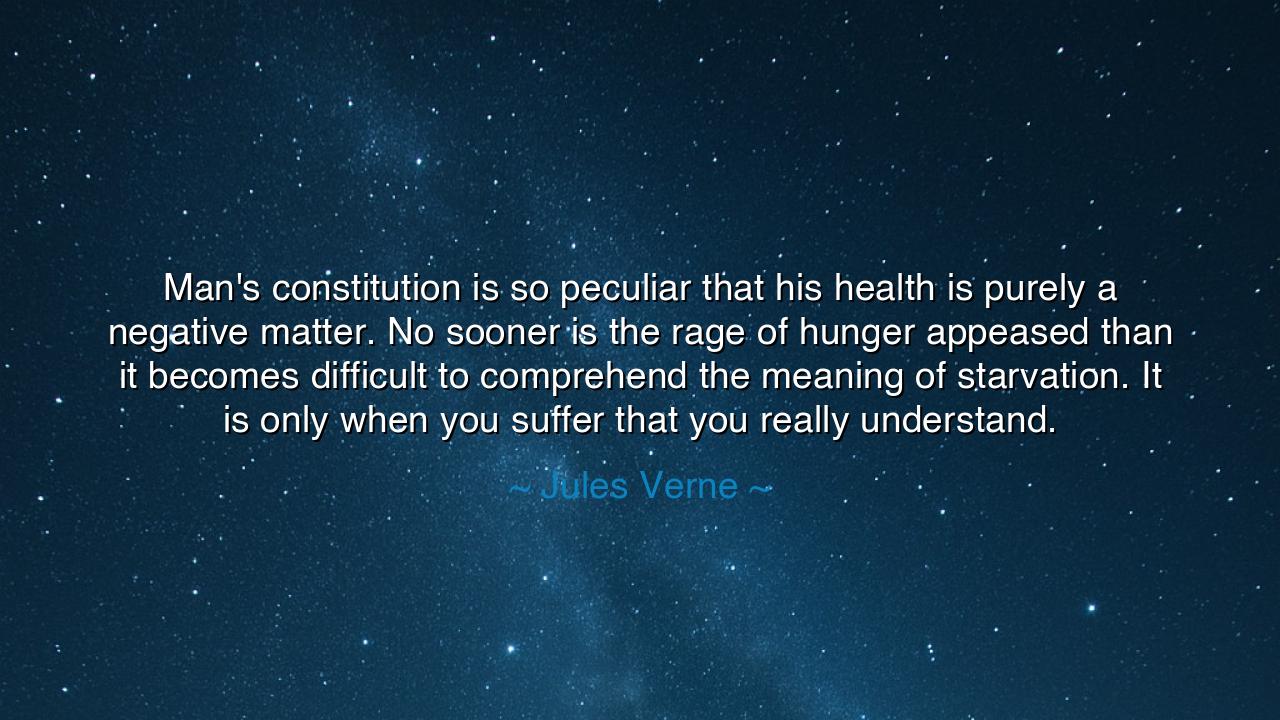
Man's constitution is so peculiar that his health is purely a
Man's constitution is so peculiar that his health is purely a negative matter. No sooner is the rage of hunger appeased than it becomes difficult to comprehend the meaning of starvation. It is only when you suffer that you really understand.






In the quiet depths of reflection, Jules Verne, master of adventure and prophet of the human spirit, once wrote: “Man’s constitution is so peculiar that his health is purely a negative matter. No sooner is the rage of hunger appeased than it becomes difficult to comprehend the meaning of starvation. It is only when you suffer that you really understand.” Though born from the pages of his literary explorations, these words speak to a truth far older than science or story — the truth that human understanding is born not from comfort, but from suffering. Verne, who imagined men sailing to the center of the earth and voyaging twenty thousand leagues beneath the sea, also journeyed deep into the inner world of man. There, he discovered this paradox of existence: that the moment pain ceases, memory of it fades, and that wisdom comes not from ease, but from endurance.
When Verne speaks of health as a “negative matter,” he reminds us that well-being, like peace, is not something we often feel in itself — it is the quiet absence of disturbance. The body at rest, free of hunger, thirst, or pain, is easily forgotten. Only when illness strikes, when the stomach gnaws or the fever burns, do we become aware of the delicate balance that sustains us. This forgetfulness is both mercy and blindness. Mercy, because it allows us to live without constant anxiety; blindness, because it breeds ingratitude. Thus, Verne warns us that comfort dulls consciousness, and that man, in his peculiar nature, must sometimes fall into suffering to remember the gift of life itself.
Consider how swiftly the hungry man, once fed, forgets the ache that tormented him. The “rage of hunger”, that consuming fire, vanishes the moment the table is laid. The full stomach cannot comprehend the agony of the empty one. This, Verne observes, is not merely a physical truth but a moral one. The well-fed cannot truly grasp the desperation of the starving unless they have known it. The healthy cannot fathom the despair of the sick unless they, too, have lain awake in pain. The secure cannot imagine the fear of the destitute. In this way, suffering is the bridge of empathy, the teacher that allows one soul to understand another.
There is a tale from history that reflects Verne’s insight — the story of Victor Frankl, a man who endured the unspeakable horrors of the concentration camps during the Second World War. In his book Man’s Search for Meaning, Frankl wrote that he came to understand life only through his suffering, that those who survived were not the strongest in body, but those who found meaning in their pain. When starvation, cold, and despair stripped away everything superficial, what remained was the naked soul — and it was there that understanding was born. Frankl’s realization is the living echo of Verne’s wisdom: it is only when you suffer that you really understand. Suffering is not something to seek, but something to revere — for it alone can reveal the depths of human resilience and compassion.
Verne’s words also speak to the fickle nature of human gratitude. When the storm has passed, we rarely remember the shelter that saved us. When health returns, we take for granted the body that once betrayed us. Man, Verne suggests, is creature of contrast, capable of perceiving light only after enduring darkness. To understand joy, one must have known sorrow; to value peace, one must have faced conflict. This is not a flaw, but a law of existence — the eternal rhythm of experience that shapes the soul. Without the shadow, the light would mean nothing.
Yet, Verne’s wisdom carries with it a call — a challenge to the mind and heart. If we forget so easily the lessons of pain, then we must train ourselves to remember even when comfort returns. To be grateful in health, to be compassionate in plenty, to be mindful of those still suffering — this is the path of wisdom. The wise man, though fed, remembers hunger; though safe, remembers fear; though whole, remembers the ache of being broken. In this remembrance, he gains humility and purpose, and becomes a healer to others.
Therefore, O listener, take this truth into your days: do not curse suffering when it comes, for it is the forge of understanding. When pain visits you, welcome it as a teacher, though it burns; when peace returns, honor it by remembering what you have learned. Look upon the comfortable not as blessed alone, but as tested — for their test is to stay awake in ease. The heart that remains mindful amid abundance, the spirit that stays compassionate amid comfort, is the mark of true nobility.
The lesson of Jules Verne’s words is both tender and eternal: that man, for all his inventions and triumphs, remains bound to the simple truths of flesh and spirit. He forgets when he is full; he remembers when he is empty. But wisdom begins when remembrance endures beyond suffering. So live with gratitude for your health, humility for your fortune, and mercy for those who still suffer — for only then will your comfort be worthy, and your understanding complete.






AAdministratorAdministrator
Welcome, honored guests. Please leave a comment, we will respond soon